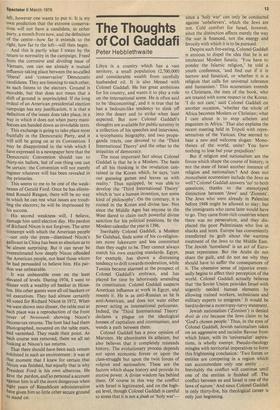The Thoughts of Col Gaddafi
Peter Hebblethwaite
Libya is a country which has a vast territory, a small population (2,700,000) and considerable wealth from carefully husbanded oil. It is also blessed with Colonel Gaddafi. He has great ambitions for his country, and wants it to play a role on the international scene. He is often said to be 'disconcerting', and it is true that he has a bedouin-like tendency to slink off into the desert and to strike when least expected. But now Colonel Gaddafi's thoughts are available for public scrutiny in a collection of his speeches and interviews, a sycophantic biography, and two propaganda tracts, one devoted to the 'Third International Theory' and the other to the iniquities of democracy.
The most important fact about Colonel Gaddafi is that he is a Moslem. The basis of all his thinking is the revelation contained in the Koran which, he says, 'cuts out guessing games and leaves us with reality.' Thus equipped, he was able to develop the 'Third International Theory' which is 'not a human invention, nor some kind of philosophy'. On the contrary, it is rooted in the Koran and divine law. Not since the Middle Ages has anyone in the West dared to claim such powerful divine sanction for his political positions. In the Moslem calendar the year is 1396.
Inevitably Colonel Gaddafi, a Moslem Sir Galahad, finds some of his co-religionists more lukewarm and less committed than they ought to be. They cannot always match his own exacting standards. Egypt, for example, has shown a distressing tendency to drift towards moderation, while Tunisia became alarmed at the prospect of Colonel Gaddafi's embrace, and has played for time by laboriously amending its constitution. Colonel Gaddafi suspects American influence at work in Egypt, and resents it. He is as anti-Russian as he is anti-American, and does not want either power acting as international policeman. Indeed, the 'Third International Theory' declares a plague on the ideological houses of capitalism and communism, and wends a path between them.
Colonel Gaddafi has a poor opinion of Marxism. He abominates its atheism, but also believes that it completely misreads history. The evolutionary process depends not upon economic forces or upon the class-struggle but upon the twin forces of religion and nationalism. These are the factors which shape history and provide its motive power. A divine wisdom lies behind them. Of course in this way the conflict with Israel is legitimated, and on the highest level, though Colonel Gaddafi is careful to stress that it is not a jinah or 'holy war'—
since a 'holy war' can only be conducted against 'unbelievers', which the Jews are not. Cold comfort for Israel, however, since the distinction affects merely the way the war is financed, not the energy and ferocity with which it is to be pursued.
Despite such fire-eating, Colonel Gaddafi is anxious to dispel the idea that he is an intolerant Moslem fanatic. 'You have to ponder the Islamic religion,' he told a youth conference, 'and find out if it is narrow and fanatical, or whether it is a religion that calls for universal tolerance and humanism.' This ecumenism extends to Christians, the men of the book, who are treated with some respect in the Koran. 'I do not care,' said Colonel Gaddafi on another occasion, 'whether the whole of Africa becomes Moslem or Christian; what I care about is to stop atheism and paganism in Africa.' That also explains the recent meeting held in Tripoli with representatives of the Vatican. One seemed to hear a new and welcome slogan: Monotheists of the world, unite! You have nothing to lose but your prejudices!
But if religion and nationalism are the forces which shape the course of history; is not the state of Israel another instance of religion and nationalism ? And does not ,monotheist ecumenism include the Jews as well ? Colonel Gaddafi answers 'no' to both questions, thanks to the stereotyped distinction between 'Jews' and 'Zionists'. The Jews who were already in Palestine before 1948 might be allowed to stay ; but the immigrants who came later would have to go. They came from rich countries where there was no persecution, and they displaced the poor Palestinians who live in shacks and tents. Europe has conveniently transferred its guilt about the wartime treatment of the Jews to the Middle East. The Jewish 'homeland' is an act of European repentance. But the Arabs do not share the guilt, and do not see why they should have to suffer the consequences of it. The obsessive sense of injustice eventually begins to affect their perception of the world. Colonel Gaddafi actually believes that 'the Soviet Union provides Israel with urgently needed human elements by allowing trained workers, technicians and military experts to emigrate.' It would be hard to devise a more topsy-turvy statement.
Jewish nationalism ('Zionism') is denied droit de cite because the Jews claim to be 'God's chosen people.' Thus, in the eyes of Colonel Gaddafi, Jewish nationalism takes on an aggressive and racialist flavour from which Islam, with its 'universalist' aspirations, is wholly exempt. Pseudo-theology mingles with territorial imperatives to form this frightening conclusion: 'Two forces or entities are competing in a region which can accommodate only one entity . . . Inevitably the conflict will continue until one of the entities is finished off. The conflict between us and Israel is one of the laws of nature.' And since Colonel Gaddafi is only thirty-five, his theological Career is only just beginning.


































 Previous page
Previous page